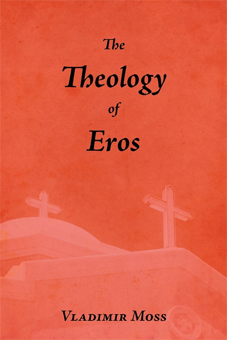THE THEOLOGY OF EROS

by Vladimir Moss
Paperback (August 2010)
ISBN: 978-1-933275-45-1
Price: $21.95 + S&H (USD)
The Theology of Eros owes its origin to a recent debate in the Russian Orthodox theological literature on the nature of eros and the status of married Christians and sexual love within marriage. The present work attempts to expound the nature of eros, marriage and monasticism from the perspective of the Holy Fathers of the Orthodox Church. The Holy Fathers, especially the Greek Fathers from the fourth to the fourteenth century, from St. John Chrysostom to St. Gregory Palamas, serve as the foundation of this work. It also uses Russian Fathers, such as St. Demetrius of Rostov, St. Tikhon of Zadonsk, St. Seraphim of Sarov, Bishop Ignatius Brianchaninov, Bishop Theophan the Recluse, St. John of Kronstadt, Archbishop Theophan of Poltava and New Hieromartyr Gregory (Lebedev). More contemporary Orthodox philosophers and theologians, such as Bishop Nikolai Velimirovich, Archpriest Lev Lebedev, Hieromonk Seraphim Rose, Vladimir Soloviev, S. L. Frank, S. V. Troitsky, Vladimir Lossky, I. A. Ilyin, John Romanides, Panagiotis Trembelas, Panagiotis Nellas, Georgios Mantzaridis, Anestis Keselopoulos and Philip Sherrard, are used to provide insight into this topic. Fr. Seraphim Rose pointed to the need for study such as is found in The Theology of Eros: "All of this [the true nature of sexuality, and of human nature before the fall, from a patristic point of view] should one day be written out and printed, with abundant illustrations from the Holy Fathers and Lives of the Saints — together with the whole question of sexuality - abortion, natural and unnatural sins, pornography, homosexuality, etc. With Scriptural and patristic sources, this could be done carefully and without offensiveness, but clearly …" This is what this book tries to achieve.
ABOUT THE AUTHOR
Vladimir Moss was born Anthony Moss in London on April 4, 1949 into the family of a British diplomat. In 1952, when his father took up a diplomatic post in Belgrade, he went to a Serbian primary school. In 1955, when his father moved to the United States, he went to an American school. Returning to England in 1958, he entered Twyford prep school, near Winchester. In 1962 he entered Charterhouse school, Godalming on a junior scholarship, specializing in Classical languages and ancient history. In 1967 he went up to Oxford University on a classical scholarship, and graduated in 1970 with a second class degree in Philosophy and Psychology. In the summer of 1970 he spent six weeks traveling and studying Russian in the Soviet Union. After six months teaching English in a language school in Bratislava, Slovakia, in 1971 he started a M.Sc. course in clinical psychology in the University of Newcastle–upon–Tyne. Abandoning the course in May, 1972, he started a Ph.D. in psychology at Surrey University, Guildford under the supervision of Dr. Don Bannister, receiving the degree in 1978 for his thesis, The Dramaturgical Deep Structure of Personality. Also in 1978 he received a diploma for the teaching of English as a foreign language from Trinity college, London. In 1974 two of his articles were published in The British Journal of Medical Psychology.
On February 15, 1974, he joined the Moscow Patriarchate in London, and was made a reader on November 21 for the English Orthodox Parish in Guildford, Surrey. In 1975 he joined the Russian Church Abroad, and on April 18, 1976 was baptised in London. In 1979, his first book, The Imperishable Word, was published.
From 1978 to 1981, he was employed as a teacher of English at the Harven school of English in Woking, Surrey.
In 1982, he was married to Olga Mount.
From 1982 to 1984, he was unemployed, and used the time to write a history of the Anglo-Saxon Church. From 1984 to 1985, he worked as a teacher of English in Thessaloniki, Greece. From 1986 to 1987, he studied Russian at the University of Surrey in Guildford, receiving a diploma. From 1987 to 1989, he was a research fellow in the Departments of Psychology and Linguistic & International Studies in the University of Surrey, designing and carrying out experiments testing the psycholinguistic theory of basic colours. The results were published in The International Journal of Psychology, Quinquereme, Lingua, and Linguistics.
In 1989, while continuing to be employed as a part-time research fellow for the University of Surrey, he took up a post as translator in the publishing house Raduga in Moscow.
Returning to England in November, 1991, he undertook Russian–English translation work for several English and Dutch companies. In 1992, he was commissioned by the Orthodox Foundation of St. Michael, Guildford to write a History of the Greek Old Calendarist Movement.
From 1993 to 1994, he was lecturer in Psychology and Religion at the University of St. Clement of Ohrid in Sophia, Bulgaria. At the same time, he taught English in the New University and in a private school.
Returning to England, he taught English at Multilingual school, Guildford (until 2000), and started a bed–and–breakfast business.
He is now fully employed in the writing of books on the Orthodox Church and Orthodox Church history.
PUBLICATIONS


